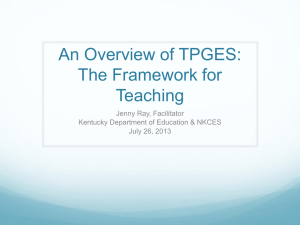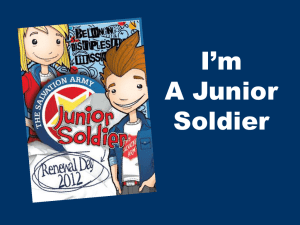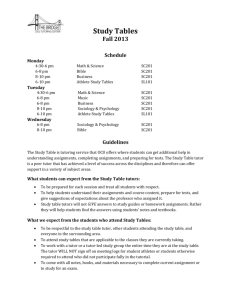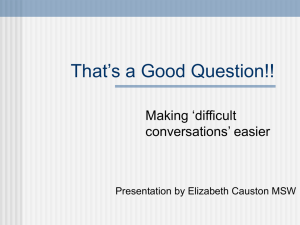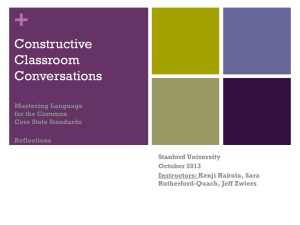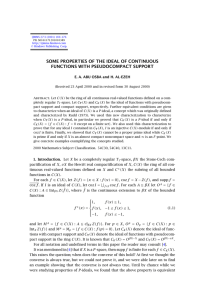Student Voices: Perceptions of learning, assignments and
advertisement
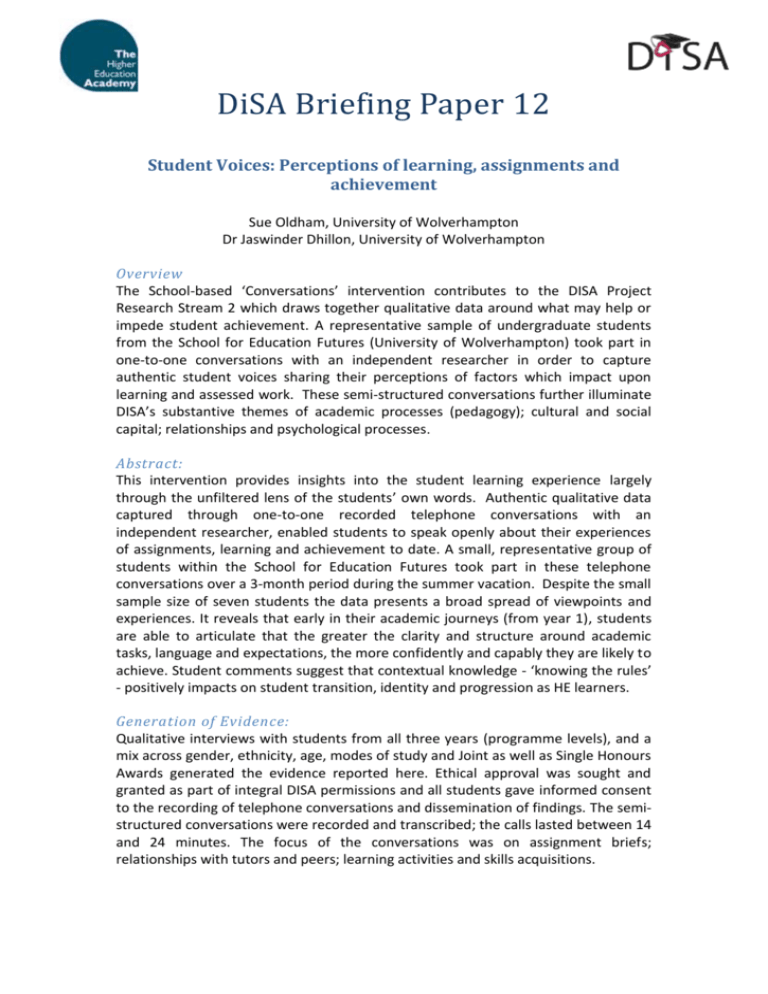
DiSA Briefing Paper 12 Student Voices: Perceptions of learning, assignments and achievement Sue Oldham, University of Wolverhampton Dr Jaswinder Dhillon, University of Wolverhampton Overview The School-based ‘Conversations’ intervention contributes to the DISA Project Research Stream 2 which draws together qualitative data around what may help or impede student achievement. A representative sample of undergraduate students from the School for Education Futures (University of Wolverhampton) took part in one-to-one conversations with an independent researcher in order to capture authentic student voices sharing their perceptions of factors which impact upon learning and assessed work. These semi-structured conversations further illuminate DISA’s substantive themes of academic processes (pedagogy); cultural and social capital; relationships and psychological processes. Abstract: This intervention provides insights into the student learning experience largely through the unfiltered lens of the students’ own words. Authentic qualitative data captured through one-to-one recorded telephone conversations with an independent researcher, enabled students to speak openly about their experiences of assignments, learning and achievement to date. A small, representative group of students within the School for Education Futures took part in these telephone conversations over a 3-month period during the summer vacation. Despite the small sample size of seven students the data presents a broad spread of viewpoints and experiences. It reveals that early in their academic journeys (from year 1), students are able to articulate that the greater the clarity and structure around academic tasks, language and expectations, the more confidently and capably they are likely to achieve. Student comments suggest that contextual knowledge - ‘knowing the rules’ - positively impacts on student transition, identity and progression as HE learners. Generation of Evidence: Qualitative interviews with students from all three years (programme levels), and a mix across gender, ethnicity, age, modes of study and Joint as well as Single Honours Awards generated the evidence reported here. Ethical approval was sought and granted as part of integral DISA permissions and all students gave informed consent to the recording of telephone conversations and dissemination of findings. The semistructured conversations were recorded and transcribed; the calls lasted between 14 and 24 minutes. The focus of the conversations was on assignment briefs; relationships with tutors and peers; learning activities and skills acquisitions. Existing Evidence: Literature shows us that first year transition is a complex and significant process (Nicholls, 2007, Briggs, 2012) particularly for ‘widening participation’ student populations. Here, we report similar findings. One first year mature, part-time student spoke of “feeling like a refugee” with a seasoned second year student reflecting “after the first year it’s easier coz you sort of know the ‘rules’ a bit better.” Research findings/ New Evidence: Five of the sample group, across all three undergraduate levels, cited the essay as their assessment of choice, with presentations and case studies also popular. Interviewees also linked their preference for assignment format to an ability or aspiration, for example a 3rd year male student prefers an assignment “when it feels like it’s something that’s going to be useful, or ... you can see why they [tutors] think it might be useful to you.". He adds, “for me, standing up presenting is great practice for becoming a teacher.” Final year students were the most positive about the purpose and experiences of assignments, with comments such as “the assessment is showing me off and my capabilities” and “it was challenging, but that was part of the reason I liked it!” This contrasted with more negative, anxious perceptions from students newer to HE, “It’s like you’re a failure if you cannot understand it.” Other emotions first year students cite include “anxious”, “panicky” and “stressful.” First year students consistently felt that written assignment briefs/instructions offered them insufficient guidance at the outset of their undergraduate study. “In the first year you’re not sure what’s expected, how much depth to go into things”. Another student felt that briefs were not “explained in a way that students understand…It’s almost like they’re missing bits, they’re just too broad.” Early introductions to briefs can shape subsequent student engagement, “if you read the brief and it seems vague, or worse, if a lecturer puts it in a complicated way... you can easily feel real confused and `depressed about it really quickly.” Students want to understand but feel ill equipped, “at level four, because you’re doing something so new and I sometimes think the lecturers don’t really appreciate how new and alien it is.” A sense of “not knowing the rules” was also apparent when students spoke about encountering concepts new to them, like referencing, literature reviews and poster presentations. Features of the lecturer-student relationship and disparities in social and cultural capital are also reflected in the data. One female BME student in her second year commented that teachers prefer “the people who talk in class all the time and ask questions.” Expanding on this, she defines this group as “people with high status, high and mighty people, y’know, with money and stuff”. The potential impact of such perceptions is clear from her next comment: “Some of the lecturers really like people like that, I suppose they like the clever, articulate ones, but it can end up making the rest of us feel stupid, if we see the lecturer leaving us behind coz they are more interested in a fancy discussion with someone really clever”. The same student shared her perception that group work can perpetuate inequity and disparity. From her first and second year, she saw that “the confident ones, especially the mature students…were dead organised and had loads of meetings” in contrast to herself and her peers, “it used to stress me out, coz my mates wouldn’t do that…most of my friends were doing everything at the last minute”. Another notion to emerge around identity and its impact of learning, centred on age. A mature student who had completed her first year commented “The older students want to get a good mark, and will put in the extra work, the younger students just leave after a class and don’t do much else.” Consistency and support from tutors is vital to performance “if I think a tutor really wants us to do well and is passionate, I think it makes me work harder. I want them to see that I ‘get’ what they’ve taught me”. On occasions when things go badly, students feel performance is affected. “My lowest grade this year was for a module where there was a clash, the timing got changed, the tutor clearly wasn’t bothered about teaching us.... It was really hard to do that assignment, partly because she wasn’t around, so the content we got was limited, but as well, because we could tell she wasn’t bothered if we passed or not”. Students call for prompt feedback. A third year student comments “while all the issues from doing the assessment and all the problems and dilemmas you can remember thinking about are still fresh in your mind, you can best make sense of anything the tutor says/writes.” Outcomes/implications for policy and practice: The student voice reflects a need for more effective academic orientation in the first year to help students better recognise and deliver what is expected of them. Practical considerations to support this might include earlier and more widespread use of exemplars, more reflective space and greater hands-on practice of academic conventions. Designing more fluid and creative forms of assessment might lessen one aspect of the insider-outsider dynamic which many students associate with formal academic processes and rules. “It’s the kind of writing they want us to do, in a funny kind of way, as much as whatever the contents are. It’s weird coz I thought I’d like the reflective stuff, coz I’m quite good at talking about things like that. But I really hate the assignments where we’ve got to do reflective accounts – I just don’t know how to write properly, like they want us to.” Students speak of wanting “the human touch” to de-code assignment briefs; one even suggested that individual tutorials to demystify a brief would be a “lifeline” for students. Perhaps then, a video cast of a tutor and student having a conversation about the assignment (shown in-class & available on VLE for repeat viewing) could be generated, to model ‘typical’ question and answer dialogue and help students make more meaning of their tasks in the earliest period of their transitions to HE.

